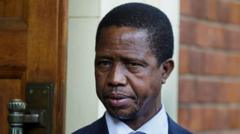Is Zambia's Ex-President's Body at the Center of a Controversial Debate?

Understanding the Controversy Surrounding Edgar Lungu's Burial in Zambia
The recent passing of former Zambian President Edgar Lungu has ignited a complex and contentious debate in Zambia, one that intertwines politics, culture, and emotions. As the Zambian government seeks to repatriate Lungu's remains for a state funeral, a fierce divide has emerged between the government and Lungu's family. This situation has evoked strong sentiments among the public, leading to a controversial atmosphere that appears to overshadow other pressing national issues. The phrase “It’s coming home,” typically associated with English football, has even found its way into this debate, marking a peculiar cultural crossover. This article delves into the intricacies of this situation, exploring the political ramifications, cultural significance, and the public sentiment surrounding the former president's burial.
The Background of Edgar Lungu's Presidency
Edgar Lungu served as the President of Zambia from 2015 until 2021. His leadership was marked by significant challenges, including economic difficulties and political unrest. The 2021 elections, which saw Hakainde Hichilema decisively defeat Lungu, were particularly contentious, with accusations of electoral fraud and suppression of opposition voices. Following his defeat, Lungu faced numerous questions regarding his administration's handling of the economy and governance. These historical tensions have only intensified in the wake of his death, complicating the mourning process for many Zambians.
The Court Ruling: A Turning Point
The recent decision by a South African court to allow the Zambian government to repatriate Lungu's body for a state funeral has escalated the controversy. The ruling was made with the argument of public interest, yet it stands in stark contrast to the wishes expressed by Lungu's family. The emotional response from Lungu's sister, Bertha, who openly criticized the government's stance, illustrates the profound pain and anger felt by the family. This incident reflects the deeply rooted divisions within Zambian society and raises questions about the role of government in personal and familial matters.
The Role of Cultural Norms
The traditional customs surrounding funerals in Zambia typically dictate that former presidents receive state funerals, often attended by the sitting president and other high-ranking officials. However, the Lungu family's insistence that Hakainde Hichilema be excluded from the funeral poses a significant challenge to these norms. The family’s desire for a dignified burial, one that aligns with Lungu's wishes, is at odds with government plans for a public state funeral. This cultural clash raises essential questions about how personal beliefs and familial rights intersect with state interests.
The Political Dimensions of the Debate
At the heart of this controversy lies a bitter political rivalry between Lungu and Hichilema. The animosity stems from years of political conflict, including Hichilema's imprisonment during Lungu's presidency. The lingering resentment has transformed Lungu's death into a political battleground, with each side using the situation to further its narrative. The government’s insistence on staging a state funeral may be viewed as an attempt to assert its authority and legitimacy, while the family's resistance reflects a desire to reclaim dignity and agency in their grief.
Public Sentiment: Divided Opinions
Public opinion on the issue is sharply divided. Supporters of the government view the state funeral as a necessary tribute to a former leader, emphasizing the importance of national unity and respect for the office of the presidency. Conversely, many sympathize with the Lungu family, believing that their wishes should be honored in a time of mourning. The phrase “It’s coming home,” used by some to celebrate the court ruling, exemplifies how political battles can intertwine with cultural sentiments, leading to an undignified and often disrespectful dialogue.
The Role of Media in Shaping the Narrative
Media coverage of the unfolding events has played a crucial role in shaping public perception. Articles and social media posts have amplified the divide, often sensationalizing the emotions surrounding Lungu's death. The portrayal of the government as power-hungry and the family as victims of political maneuvering resonates with many Zambians who are fatigued by ongoing political strife. Moreover, the sensationalist framing of the family’s resistance as a sign of defiance against the state further entrenches divisions.
Legal Implications: The Family's Appeal
The Lungu family’s decision to appeal the court ruling reflects their determination to secure a burial that aligns with their values and traditions. This legal battle underscores the complexities of state versus familial rights in matters of death and mourning. The absence of a clear legal framework governing the burial of former presidents adds another layer of uncertainty, allowing for disparate interpretations of what constitutes a dignified burial. As the family awaits the outcome of their appeal, the nation watches closely, anticipating the next chapter in this unfolding saga.
Potential Outcomes and Their Implications
The next steps in this controversy remain uncertain. Should the court rule in favor of the family, it may set a precedent for how future leaders are treated posthumously, potentially reshaping the interplay between governmental authority and personal wishes. Conversely, if the government proceeds with its plans for a state funeral without the family's involvement, it could exacerbate existing tensions and deepen the political divide in Zambia. The implications of this decision will likely resonate beyond the immediate context of Lungu’s burial, influencing future political interactions and public sentiment towards governance.
Conclusion: A Nation Divided
The saga surrounding Edgar Lungu’s burial encapsulates the deep divisions within Zambian society, revealing how politics can seep into every facet of life, including death. As the nation grapples with the implications of this situation, it serves as a reminder of the complex interplay between personal grief, cultural practices, and political power. The future remains uncertain, but one thing is clear: the phrase “It’s coming home” may linger in the air, a symbol of both hope and division within the Zambian context.
FAQs
What were Edgar Lungu's contributions as President of Zambia?
Edgar Lungu's presidency was marked by both achievements and challenges, including economic reforms, infrastructure development, and significant political controversies. His leadership style and policies have been debated extensively, particularly in the wake of his electoral defeat in 2021.
Why is the burial of former presidents significant in Zambia?
The burial of former presidents is significant as it reflects national respect and honors their service to the country. Traditionally, ex-leaders are given state funerals, symbolizing their importance in the political landscape and the collective memory of the nation.
How does the public perceive the government's role in Lungu's burial?
Public perception is divided; some view the government's insistence on a state funeral as respectful, while others see it as an infringement on the family’s wishes. This reflects broader sentiments about governance and authority in Zambia.
What impact might this controversy have on future political relations in Zambia?
The outcome of this controversy may set a precedent for how future leaders are treated after their passing, influencing the dynamics between the government and families of ex-presidents. It could either exacerbate existing tensions or pave the way for a more collaborative approach in the future.
As Zambia navigates this complex situation, one must ponder: How can the nation reconcile its political divisions while honoring the memory of its former leaders? #Zambia #EdgarLungu #PoliticalDivisions
Published: 2025-08-15 06:45:23 | Category: world



